Looking ahead, looking back
The is named in honor of a member of the ͵��͵�� and ͵��͵�� Biology who passed away in 2016.
Throughout her education and career as a researcher, Marion Sewer promoted diversity and inclusivity within the scientific community. As a member of the ASBMB Minority Affairs Committee, she founded the society’s grant-writing workshop and mentorship program to help support early-career scientists from underrepresented minority groups. That program evolved into Interactive Mentoring Activities for Grantsmanship Enhancement, or IMAGE.
The mission of the committee is “to increase cultural diversity in fields of biochemistry and molecular biology by increasing participation, visibility and status of minorities within ASBMB.” This scholarship (formerly the Distinguished Undergraduate Scholarship) was created to provide financial support for students who demonstrate an interest in these fields and enhance the diversity of science.
Each year, the MAC and the Student Chapters Steering Committee select up to five undergraduates to receive up to $2,000 toward tuition. Applicants provide statements about significant barriers they have faced and their commitment to promoting diversity on campus and in the scientific community.
Here, the 2018 Sewer recipients introduce themselves, and we take a look back at the 2017 recipients and find out how some of them benefited from this scholarship. Their comments have been edited for length and style.
2018 recipients
Vidal ArroyoChapman University (Orange, California) After completing my undergraduate degree in biochemistry and molecular biology, I will pursue an M.D./Ph.D. dual degree in biomedical informatics so I can serve society as an oncologist, cancer researcher and mentor of students from disadvantaged backgrounds. With my research, I hope to advance the field of oncology by building computational tools that can be used by physicians. Specifically, I wish to develop clinical support tools that can be used to partition certain cancer treatments based on a patient’s genetic and clinical characteristics. With this work, I will reduce the late effects seen among survivors of pediatric cancer by bettering how we treat children with cancer. |

Vidal Arroyo
|
Mauricio FloresUniversity of California, Riverside I plan to go to graduate school to pursue a Ph.D. in molecular biology for biomedical research to help develop new forms of treatment to combat illnesses and disorders that affect millions of people every day. This is mostly due to my experience growing up in a lower-socio-economic community and watching sick people suffer because they were unable to afford healthcare. Finding effective and cheaper forms of treatment would be my way of giving back to the community that raised me. |
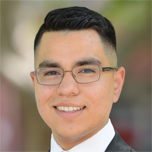
Mauricio Flores
|
Tanya PierreAgnes Scott College (Decatur, Georgia) I want to pursue a career in biomedical research that allows me to work with my research interests in the disciplines of genetics, molecular biology, immunology and toxicology. Although I am not entirely sure what my future career will look like, I know that I want the flexibility to interact with young scientists in my community through mentoring and volunteering programs. |
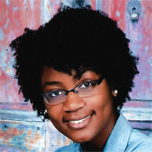
Tanya Pierre
|
Danyal TahseenTrinity University (San Antonio) I aspire to work in academic medicine so I can see patients in a teaching hospital while mentoring students and residents, while also participating in research and delivering lectures. Within that framework of academic medicine, I want to choose a specialty like dermatology that has a large scope for research as well as long-term doctor-patient relationships so I can accompany my patients on their medical journey from both emotional and physiological perspectives. I would love to do research on diseases like vitiligo, the differing perceptions of those diseases in various cultures and how that affects patient care, as well as more wet lab projects exploring the molecular pathways of novel drugs targeted toward these diseases. Lastly, I want a facet of my career to involve inspiring young students from minority groups that don’t think being a physician is a possibility for them. This would let me do my part in diversifying the future medical workforce by showing first-generation students the steps to becoming a doctor and/or researcher and that it’s awesome to dream big. |
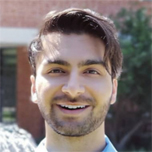
Danyal Tahseen
|
Francisco ZepedaMassachusetts Institute of Technology (Cambridge, Massachusetts) I am a second-year bioengineering student with experience in cell culture, histology and immunology. I love biology because it is such a multifaceted discipline and has limitless possibilities for collaborations with individuals from other fields. Recently, I have been working on building a robust set of electrical engineering techniques to help solve the problems I come across in lab. Outside of science, I am involved with cultural and political groups, and I have a passion for youth outreach. I plan to pursue an M.D. and develop a pediatric specialty. A more immediate goal of mine is to secure an internship that fits my skill set. I believe my persistence, quick learning and ability to work in teams would make me a great coworker. |
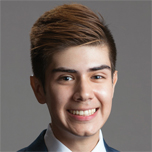
Francisco Zepeda
|
2017 recipients
Nnedi AgubokwuLincoln University (Oxford, Pennsylvania) Nnedi Agubokwu earned her B.S. in biochemistry and molecular biology in May 2018. In high school, she did biomedical research at the Children’s Research Institute and completed an 80-hour training program to educate her peers on studying for the SAT, applying to colleges and receiving scholarships. At Lincoln University, she was a mentor for the empowerment of young black women. She also completed research internships at Lincoln and at the Sidney Kimmel Cancer Center of Thomas Jefferson University, where she investigated a mutation in men with prostate cancer with the aim of expanding genetic testing. An update from Nnedi: "I experienced a high level of stress throughout my time in college due to coursework, balancing extracurricular activities and working multiple jobs. With the help of this scholarship, my senior year was much less stressful. I was able to attend research conferences to present my research, such as ASBMB’s annual meeting, and focus more on my academic and future professional endeavors. Being in these spaces allowed me to connect with my peers and those who have achieved the goals I am working toward." |
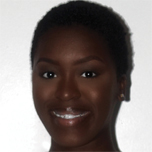
Nnedi Agubokwu
|
Edgar Maxwell FaisonUniversity of North Carolina at Chapel Hill Edgar Faison is a first-year graduate student at UNC Chapel Hill who is interested in the physics and chemistry behind protein structure, stability and interaction. The most direct application of this is studying disease etiology as it relates to protein misfolding or abhorrent interactions within the cell. Alternatively, a deep understanding of protein physics can be applied to protein engineering. After graduate training, he would like to mentor students and work to increase diversity in the STEM field, creating a more representative and robust scientific community. This includes outreach to communities and high schools that may not be able to encourage young people to pursue science. An update from Edgar: "As an undergraduate, I was heavily involved in the Chancellor’s Science Scholars, a program aimed at increasing minority representation in the sciences and higher learning in general. The Sewer scholarship helped me encourage minority excellence at Carolina by serving as an example for my younger peers and as a point of contact for anyone else who was interested in applying for the award. I believe the Sewer award helped me encourage their success and journey through science." |
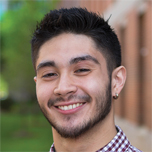
Edgar Maxwell Faison
|
Miranda MasonUniversity of Louisville (Kentucky) Now a senior at the University of Louisville, Miranda Mason is pursuing an individualized major in medicine and society with minors in biology and political science. After graduation, she intends to study medicine and then pursue a pathology residency so as to work behind the scenes of medicine as a “doctor’s doctor” with opportunities to better study the mechanisms of disease. An update from Miranda: "With the financial support of the Sewer scholarship, I was able to take part in research instead of taking another job. I could afford rent and supplies without the support of my family, thus not only relieving financial pressure but also allowing me to act independently of my family’s expectations. This has enabled me to be more outspoken on issues and causes I care about that they do not support." |
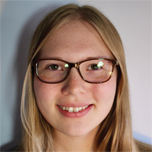
Miranda Mason
|
Daniela GomezZubieta University of Michigan–Dearborn As an undergraduate, Daniela Gomez Zubieta followed her passion for human rights through service work at a free clinic in Detroit and overseas work in Honduras. These experiences exposed her to economic injustice that drove her to pursue medicine with the goal of becoming a physician serving as an advocate for underserved populations. She wants to work toward closing gaps between access to healthcare and minority groups as a scientist and physician, possibly by obtaining an M.D./Ph.D. She planned to continue basic research in neuroscience and molecular and cell biology, using her dual degree to treat patients while working to better their treatment options and knowledge of their pathologies. Her goal is to answer scientific questions such as “How can we better treat neurodegenerative disorders?” as well as social questions such as “Why does the burden of pathologies such as Alzheimer’s disease and dementia fall so harshly on minority groups?” |
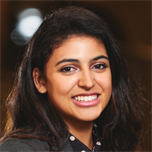
Daniela Gomez
|
Alexander Pabón CruzUniversity of Puerto Rico–Bayamón When he applied for the Sewer scholarship, Alexander Pabón Cruz’s short-term academic goal was to complete his bachelor’s degree in human biology. His long-term academic goals were to complete a doctorate in pharmacy and then work as a professor and researcher in the area of pharmacy. |
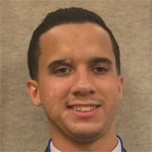
Alexander Pabón Cruz
|
Enjoy reading ASBMB Today?
Become a member to receive the print edition four times a year and the digital edition weekly.
Learn moreGet the latest from ASBMB Today
Enter your email address, and we’ll send you a weekly email with recent articles, interviews and more.
Latest in People
People highlights or most popular articles

Transforming learning through innovation and collaboration
Neena Grover will receive the William C. Rose Award for Exemplary Contributions to Education at the 2025 ASBMB Annual Meeting, April 12–15 in Chicago.

Guiding grocery carts to shape healthy habits
Robert “Nate” Helsley will receive the Walter A. Shaw Young Investigator in Lipid Research Award at the 2025 ASBMB Annual Meeting, April 12–15 in Chicago.

Leading the charge for gender equity
Nicole Woitowich will receive the ASBMB Emerging Leadership Award at the 2025 ASBMB Annual meeting, April 12–15 in Chicago.

Honors for de la Fuente, Mittag and De La Cruz
César de la Fuente receives the American Society of Microbiology’s Award for Early Career Basic Research. Tanja Mittag and Enrique M. De La Cruz are named fellows by the Biophysical Society.

In memoriam: Horst Schulz
He was a professor emeritus at City College of New York and at the CUNY Graduate Center in Manhattan whose work concentrated on increasing our understanding of mitochondrial fatty acid metabolism and an ASBMB member since 1971.

Computational and biophysical approaches to disordered proteins
Rohit Pappu will receive the 2025 DeLano Award for Computational Biosciences at the ASBMB Annual Meeting, April 12-15 in Chicago.

